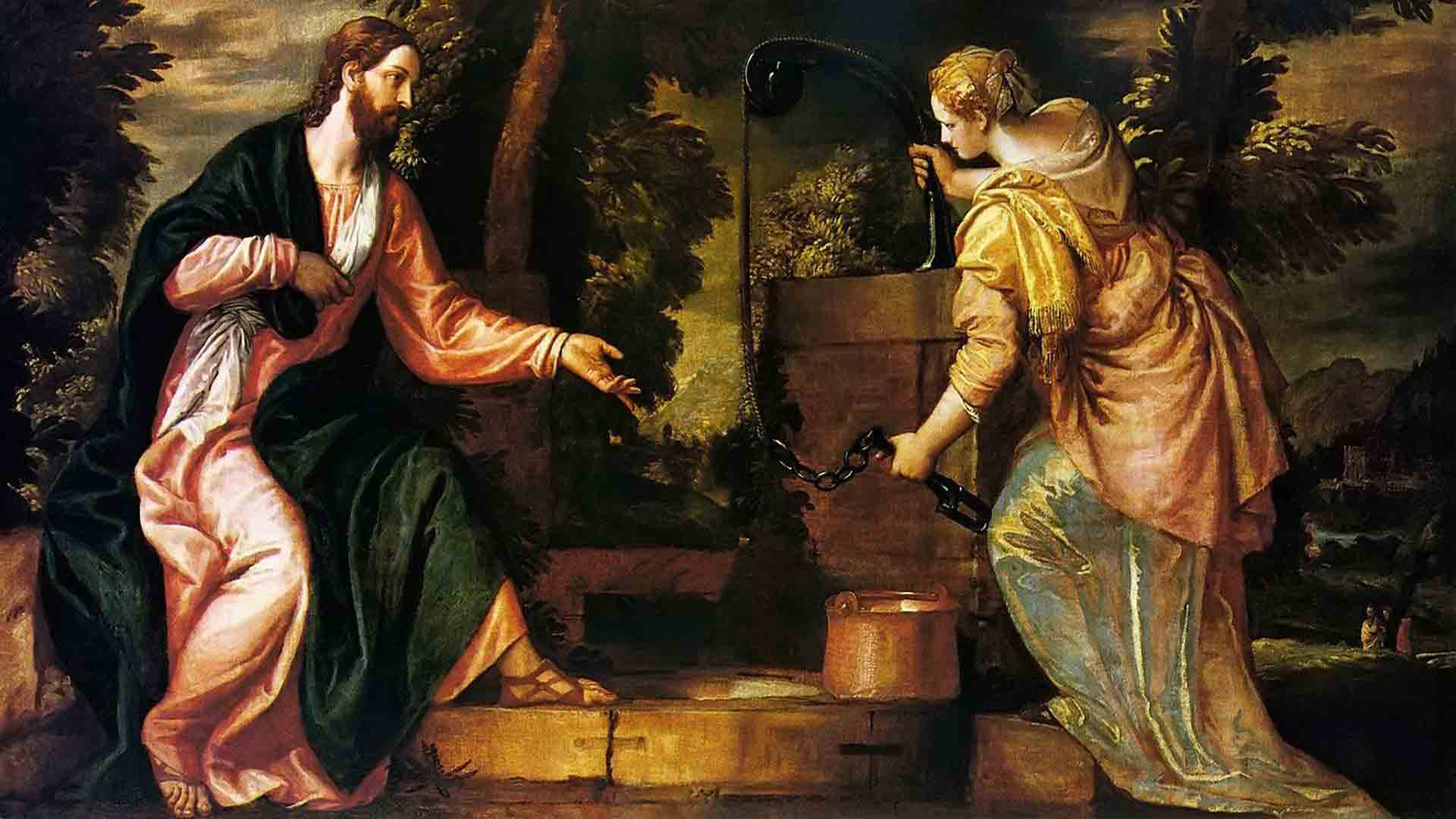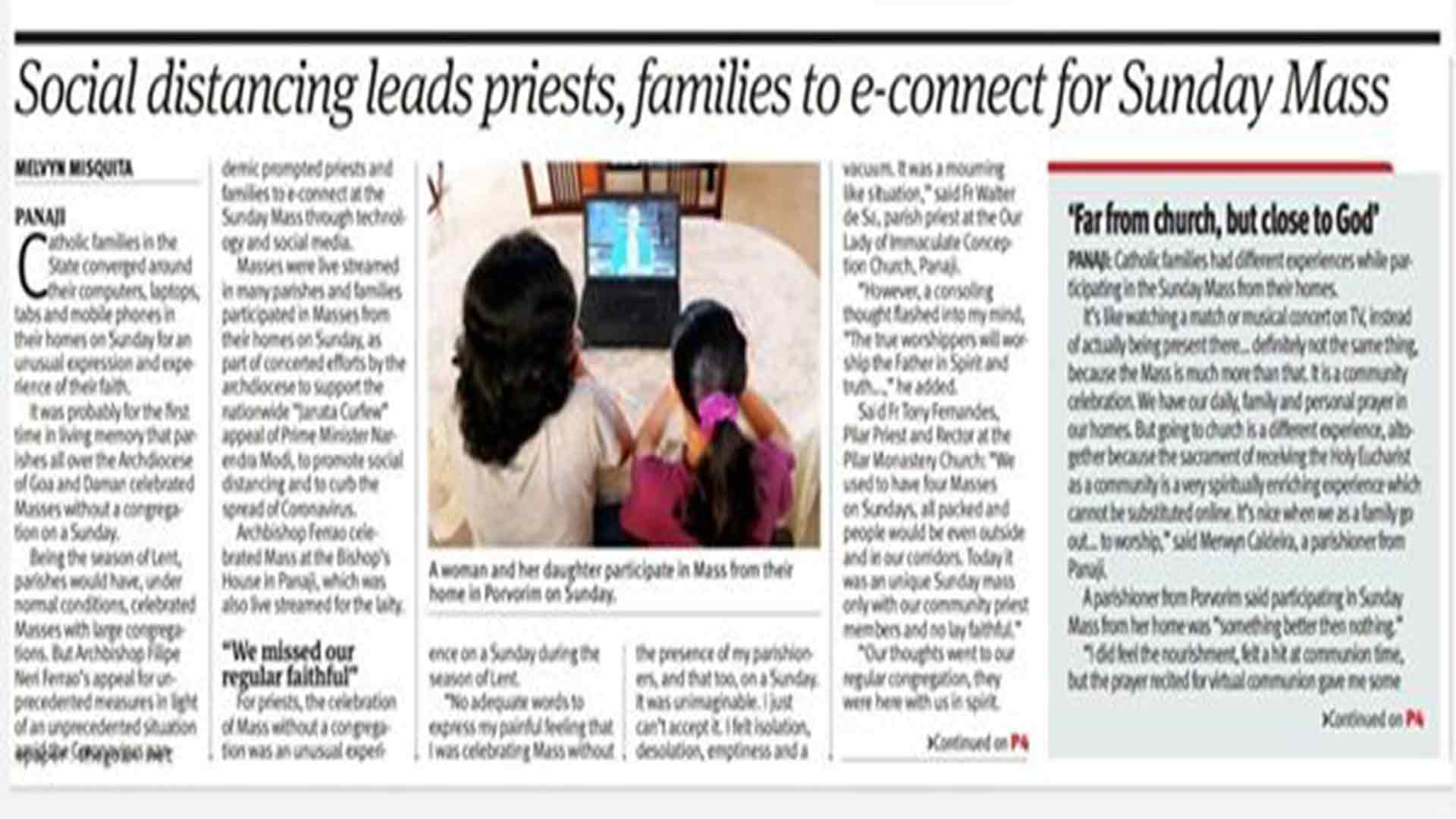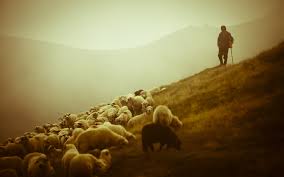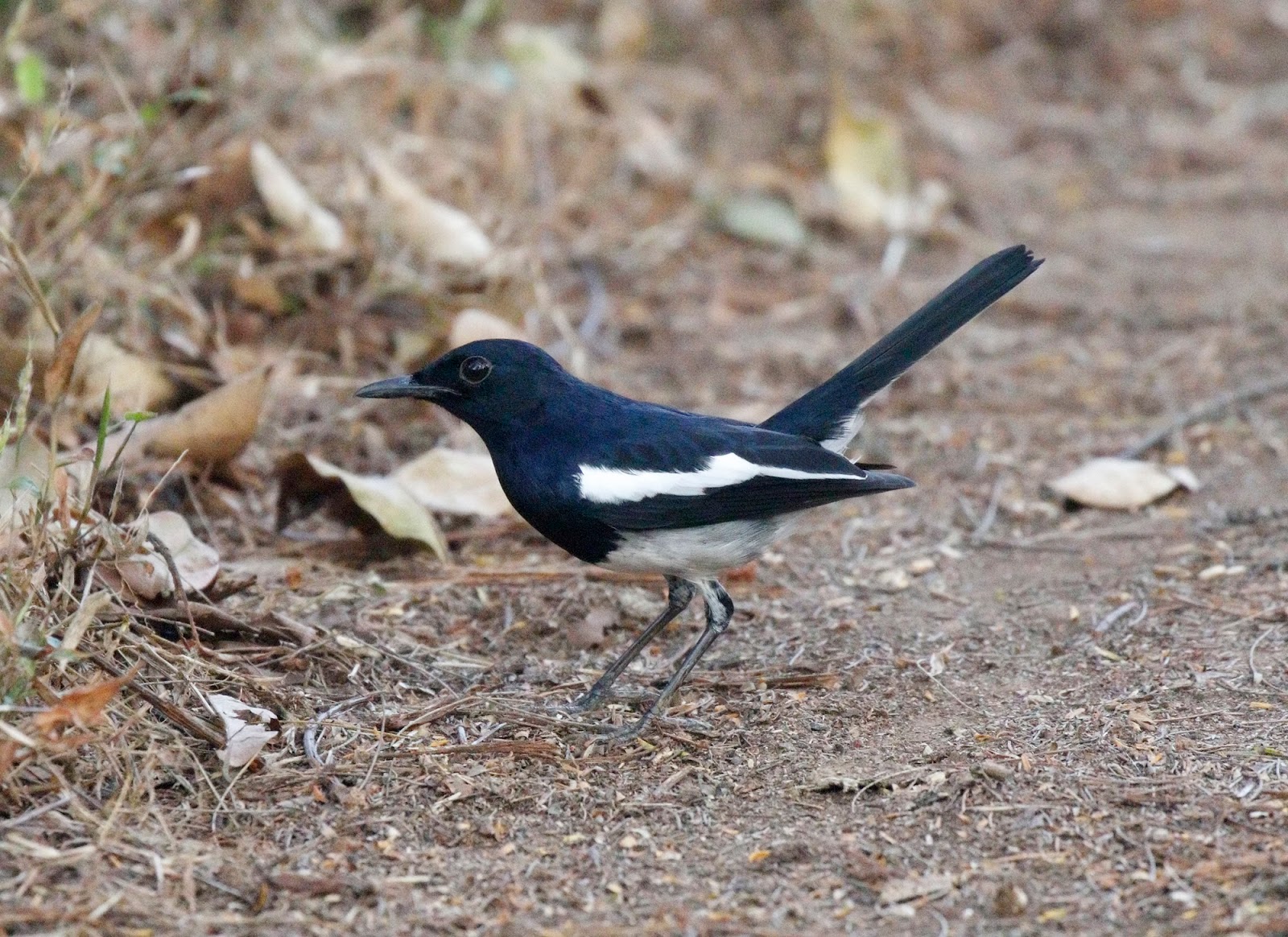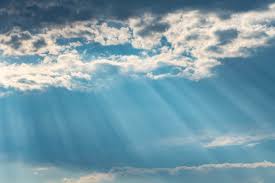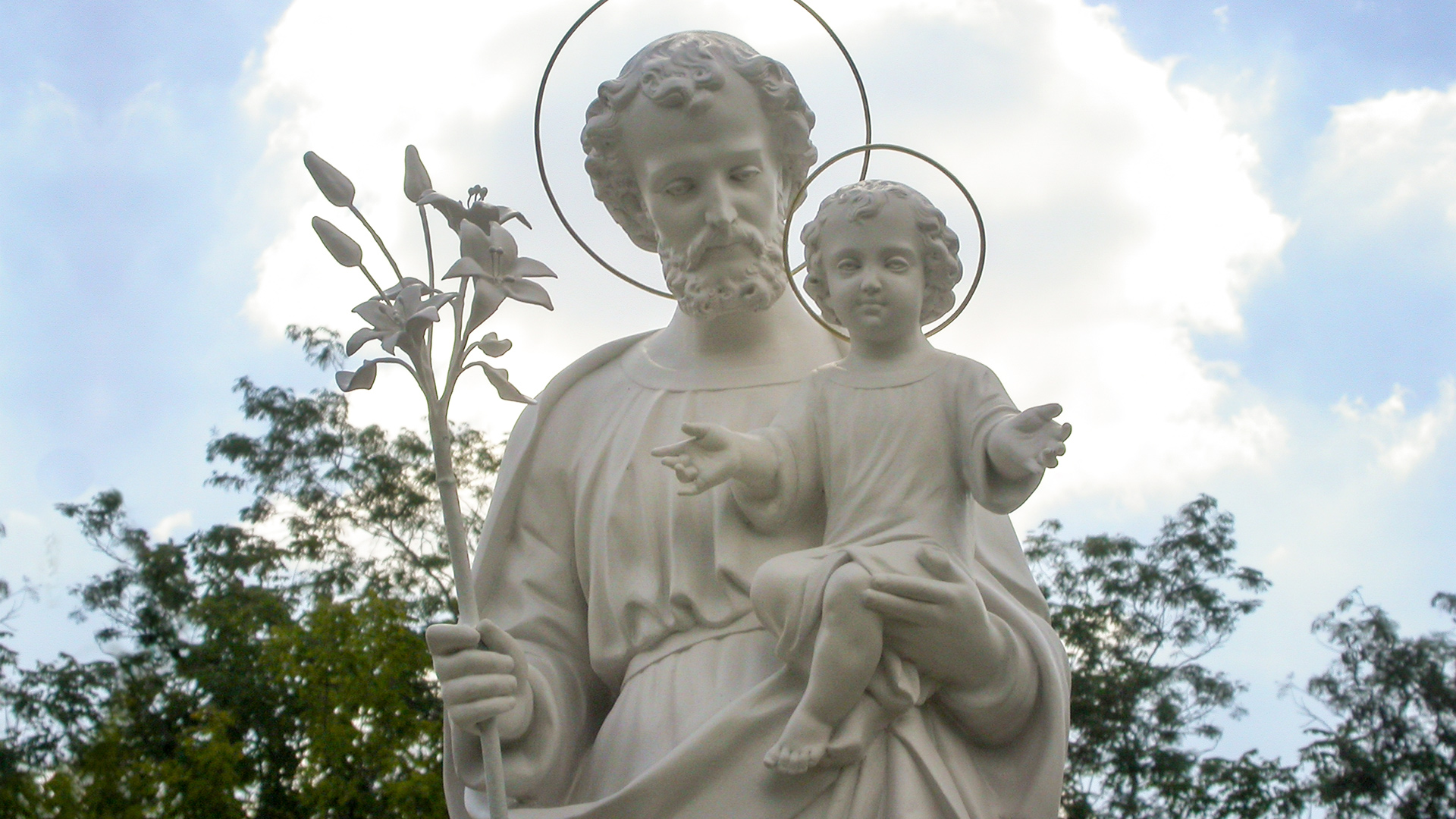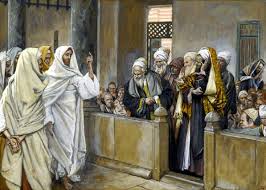Come to the spring of living water
LENT 2020 – Day 28
Readings: Ezek 47, 1-9.12; Ps 45, 2-3, 5-6, 8-9; Jn 5, 1-3, 5-16
In that enigmatic passage from the prophet Ezekiel, Water is a dominant image: “water issuing from below the threshold of the temple.” The Angel takes the prophet on a guided tour of the temple; and the more they go round the more they get immersed in those waters. Nonetheless, the water image spelled hope for a land that suffered from drought. It was God's promise to His people in exile in Babylon, an invitation to return to their land.
In the present days, never mind the grim picture of Covid-19, we too see signs of God healing and restoring the environment following the global slowdown. The physical environment apart, for us who belong to Christ it is the spiritual environment that we regard as decisive. It is therefore significant that Ezekiel’s vision points to none other than Christ as being that Temple. In fact, Christ is the spring of living water, who said, “Whoever believes in me… out of his heart shall flow rivers of living water” (Jn. 7, 38). It’s a grace He gives us at the baptismal font, but which by and by we sully with sin.
That is precisely why we need the Master Physician. Look at the marvels He performed at the pool by the Sheep Gate. In it lay a multitude of invalids, blind, lame, paralysed. They hoped that the waters “stirred” by the Angel would heal them. Meanwhile, Jesus cured the lame man, and went His way, but the cure stirred up a hornet's nest since that day was the Sabbath.
Now compare the Jewish protocol with the new one established by Him who came to perfect the law. The Jews bided their time to find fault and accuse others whereas Jesus opened up new horizons. He was keen on saving the people from physical and spiritual illnesses.
The relation between the two readings is now evident. We have to put all those vicious minds in our midst, those “stagnant waters of the sea”, behind us and go ahead and immerse ourselves in the living waters that spring forth from Jesus, our Lord and Saviour.... “Come, consider the works of the Lord, the redoubtable deeds He has done on the earth.”
First televised Mass fulfilling Sunday obligation
'How was your Mass on the fourth Sunday of Lent, 22 March 2020?' That's what my journalist friend Melvyn Mesquita of The Goan wanted to know. Here's what I said him about my experience of participating in a live streamed Mass yesterday....
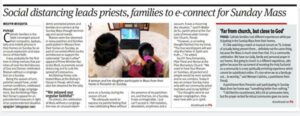
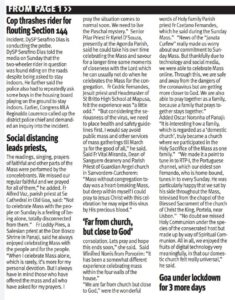
“It is interesting how a family, which is regarded as a ‘domestic church’, truly became a church where we participated in the Holy Sacrifice of the Mass as one family.
“We made it a point to tune in to Rádio Televisão Portuguesa Internacional (RTP-i), the Portuguese channel, which our eldest son Fernando, who is home-bound, tunes in to every Sunday. He was particularly happy that we sat by his side throughout the Mass, televised from the chapel of the Blessed Sacrament of the church of Christ the King, Portela, near Lisbon.
“No doubt we missed Holy Communion under the species of the consecrated host but made up by way of Spiritual Communion. All in all, we enjoyed the fruits of digital technology very meaningfully, in that our domestic church felt really universal.” (The Goan, 23 March 2020)
For one, it felt quite odd to be attending Sunday Mass at home. Then, it was sad to see only a handful of people holding it for us in loco: the main celebrant, Mgr. Joaquim Mendes, auxiliary Bishop of Lisbon, two concelebrants, three readers and three gent choir members. The Bishop preached to an empty church, yet it was gratifying to see his message going across the globe.
Way back in the year 1940, Mgr. Fulton Sheen was one of the first priests whose Mass was televised. It was telecast by the experimental W2XBS, a CBS affiliated TV station. During the sermon, Sheen is known to have remarked, "This is the first religious television in the history of the world. Let therefore its first message be a tribute of thanks to God for giving the minds of our day the inspiration to unravel the secrets of the universe."
Some two decades ago I had a vicarious experience of a televised Mass, through a senior citizen in the Goan village of Benaulim. He would be seated, all suited and booted, before the TV, eager to fulfil his Sunday obligation in the comfort of his home, thanks to RTPi. Back then, his Sunday habit had evoked peals of laughter amid family and friends. It was only much later that I realized the idiot box legitimately fulfilled an earnest desire.
Eventually, the Eternal Word Television Network (EWTN) entered our home. More recently, some Christian channels started locally, and finally the Catholic Charismatic Renewal Television (CCRTV), modelled largely on EWTN, made its presence felt in Goa in December 2017. But it was only much later that I came to appreciate its benefits for the home-bound.
For example, our son Fernando, is a Sunday TV Mass goer. He waits to meet the Lord via television, whether or not a Eucharistic minister from Stella Maris chapel has administered him Holy Communion that morning. He has a touchingly respectful posture, which he sometimes finds difficult to adopt when he is at Mass amid a large congregation in a chapel or church. Something here disturbs him; but at home, left to himself or in company, he doesn't show any signs of irritation.
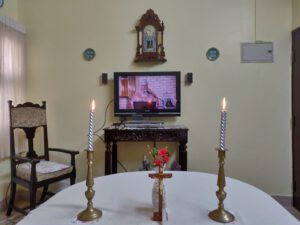
On the fourth Sunday of Lent this year, we prepared a table with an appropriate cover, placed a candle and a crucifix on it. We gathered as a family, appropriately dressed, and recited the prayers and responses, reflected on the readings and joined in singing the hymns. No electronic device other than the TV set was on, and no chores allowed. We focused on the Holy Eucharist, immersed ourselves in the presence of God and received Spiritual Communion. All that was in keeping with some guidelines for attending online Mass which I'd read and disseminated on social media the previous day.
Fulton Sheen was right. The daily message on several religious television stations in the world today is indeed "a tribute of thanks to God for giving the minds of our day the inspiration to unravel the secrets of the universe." Televised Mass fulfilling Sunday obligation and weekday Masses for habitués have come to stay after the first one on 23 March 2020. It is equally important, however, that regular church services begin at the earliest in God's own House, for lovely is the dwelling place of the Lord Almighty!
Ask not what our God can do for us...
LENT 2020 – Day 27
Is 65, 17-21; Ps 29, 2.4, 5-6, 11-12a. 13b; Jn 4, 43-54
God is not a politician; He keeps his word. However, we do not keep our word for we have become worse than that breed. What Isaiah prophesied would have become a reality if Israel had responded in earnest. Unfortunately, the Chosen People paid only lip service to God, as politicians do to their voters. For His part, God again and again invited them with love and promise – “not more shall be heard the sound of weeping and the cry of distress”, and He would graciously and mercifully forget their past offences. But they rejected the covenants and even the Son of God when He came down from Heaven.
“Not more shall be heard the sound of weeping and the cry of distress”: wouldn’t that be music to our ears in the present days of the Covid-19 pandemic? Well, nothing is impossible with God. He can create new heavens and a new earth; or at the end of the world, He might even leave the material planet untouched and therein simply place an entirely new race.
Meanwhile, why can’t we be that new race? What are we lacking in? We have the promise of God’s help; we only need to respond favourably. He has given us innumerable signs; we have only to acknowledge them humbly, as did the Galileans, after they saw all that Jesus had done in Jerusalem. In fact, they’d earlier witnessed His first miracle – the changing of water into wine – in Cana of Galilee. And now He healed the son of an official who entreated Him with faith; He did not put up His price, like the politicians do.
The world would be a better place had we accepted Jesus with all our heart. Even impostors enjoy acceptance whereas an authentic prophet has no honour in his own country. Similarly, we are ever-ready to receive blessings from the Lord. When will we begin to give Him of ourselves?
Here's how to move from darkness to light
LENT 2020 - Day 26
Sam 16, 1. 6-7, 10-13; Ps 22, 1-3a, 3b-4, 5, 6; Eph 5, 8-14; Jn 9, 1-41
Samuel thought God had meant Jesse’s eldest son Eliab to be the new king of Israel, for he had great physical attributes; God told him that “the Lord sees not as man sees; man looks on the outward appearance, but the Lord looks on the heart.” What a lesson! When Samuel saw David, who had been out keeping the sheep, the Lord’s words “This is he!” were a confirmation that Jesse’s youngest son was meant to shepherd Israel.
King David became the luminous author of that familiar and most loved Psalm 23, among many others. Of course, given his background, it is in pastoral lingo that he expresses his serene conviction that the Lord is his Shepherd. The assurance that the Lord guides and protects us from every danger; that there is nothing we shall want, so nothing to fear, has always brought and will continue to bring solace to many a troubled soul.
Jesus is a descendant of the same David who wrote “If I should walk in the valley of darkness, no evil would I fear.” And there comes St Paul with these eye-opening words: “Once you were darkness, but now you are light in the Lord.” He exhorts us to walk as children of the light – lovers of the good, the right and the true – a veritable priesthood. “I am the light of the world, says the Lord; he who follows me will have the light of life.”(Jn 8,12) That’s a promise.
The Gospel of today is a practical illustration of how Jesus brings us out from the darkness to the light. He doesn’t look at our worldly learning but at our faith and trust in Him. Proof of this is that while the blind man became “enlightened” (so his blindness was not really a punishment for any previous sin, it was indeed a glorious way of manifesting God’s works), the proud Pharisees and others were gradually sinking into greater darkness – they’d refused to believe, or even plainly accept, so were blinded by the bright Light of the World.
Our Evening Visitor
A chirpy bird descends on even the gloomiest of us, stuck indoors amidst a raging pandemic, with something of the blessing of a fine day. So it is with the oriental magpie-robin, our evening visitor.
For the past two years or so that we know him, he has been touching base around seven o’clock. Till date he hasn't arrived beyond 7.17 p.m. We make it a point to retire by the time of the Angelus prayer and let him come into our veranda at ease. Soon our feathered friend drifts down from the dark sky, greeting our household with a melodious chirp just a few syllables long. Is that merely to announce his arrival? No. It feels more like a polite request for permission to stay the night.
Night after night it’s the same pleasant story. The gentle bird settles on the clothes drying rack, at the very same point, and there’s not a sound from him thereafter.
Once we spotted him flying out, almost certainly with a quick goodbye chirp, a few minutes after four… perhaps to bathe in the morning dew, before getting on with the day’s work….
Will he ever hullo us at our place of work?! Maybe he did fly across to us sometime in the past, but in our usual hullabaloo we might well have overlooked the visitation…
In these grim times, as we humbly reach out to help Nature heal, we wish to be a little more hospitable and offer our honoured guest food and water. But we are no experts: could someone advise us on the protocol?
Tailpiece: Today, as we find ourselves practically under house arrest, in view of the COVID-19 pandemic, the birds in the sky come across as particularly carefree. We finally understand the full import of the Scriptural passage: “Look at the birds of the air; they do not sow or reap or store away in barns, and yet your heavenly Father feeds them. Are you not much more valuable than they? Who of you by worrying can add a single hour to his life?” (Mt 6: 26)
Steadfast love, not burnt offerings, for the Lord
LENT 2020 – Day 25
Readings: Hos 5, 15-6,6; Ps 50, 3-4,18-19,20-21; Lk 18, 9-14
Like a child who yearns for the love and not the riches of his parents, God asks of us steadfast love and not sacrifice. But alas, we turn to Him only in difficult times – maybe when a dear one is in hospital or a near one is answering an exam. At other times we may pretend to be ‘self-made’ and self-sufficient… What a travesty of the truth, when in fact we can move only at God’s bidding.
Who is this God of ours? Do we really wish to know Him? Knowing our Creator and Saviour is a human need; loving Him, our bounden duty. However, our conceit prompts us to assume that we have done God a favour by our charitable work. Sometimes we compare ourselves favourably with others, 'lesser mortals'.
That only goes to prove that we encounter God by human standards. Or that we don’t know Him well enough. For His part, God loves the humble. He showed love to that loathsome tax collector who opened his heart out, saying, ‘God, be merciful to me a sinner!’ It is the likes of these that go home happy, “for everyone who exalts himself will be humbled, but he who humbles himself will be exalted,” says the Lord.
The rule of thumb is that we shouldn’t sit in judgement. Not only are we unaware of the difficult times the other is going through, it doesn’t even befit us to judge. Only our Father in Heaven is entitled to do so. Our role is to smile, say a good word, and love!
Love in the time of Covid-19 - and always
LENT 2020 – Day 24
Hos 14, 1-9; Ps 80, 6-c-8a, 8b-9,10-11,14,16b; Mk 12, 28-34
Inscrutable are the ways of the Lord God maker of all things.... Like the people of Israel who lived in the midst of fear and anxiety, we too are in the midst of a great scare; and like them, who thought they were masters of their own destiny, we have for too long lived as though God does not exist – until now when the infinitesimally small corona virus has taught us a lesson in powerlessness.
We'd stumbled when we said “Our God” to the work of our hands; we’re now responding to God’s call to return to Him. Haven’t we realized already that we can do with a little less work, money, power and, above all, pride? We must set our priorities right. We can’t do without prayer, thanksgiving and praise to Him who is our Lord and Master, our Creator and Saviour. For His part, He has promised to heal our faithlessness, continue to love us, and be to us like the dew to Israel.
There are marvellous things in store, only if we stop and listen, dialogue, accept, love... Then we shall blossom. Meanwhile, let’s admit that we’ve been worshipping a fake trinity – Mammon, Bacchus and Cupid. Mind you, like the wife who watches her husband, so is our God watching us, and saying: “The Lord is one; and you shall love the Lord your God will all your heart, and with all your soul, and with all your mind, and with all your strength…. You shall love your neighbour as yourself.”
Very often we think we won’t understand God’s ways; but if we care to listen, we will. Now is that time to listen. In this lock-down let’s open our hearts and rekindle our relationship with our God and our family – and set the big wide world afire with our love….
Faithful to the end
LENT 2020 – Day 23
Readings: 2 Sam 7: 4-5a; Ps 89: 2-3,4-5,27,29; Mt 1: 16, 18-21, 24a
God promised Abraham that his descendants would be like the stars of the sky and “inherit the world”. Some fourteen generations later God spoke in similar fashion to David: He promised through faith that He would raise up his kingdom and build a dynasty that would last for ever. He only commanded David to build a house for Him.
What a great honour and privilege to be chosen by God Himself. Way down in David’s patrilineage was Joseph, the father of Jesus, who believed in hope and did what God told him to do. Chaste Joseph accepted the mystery of the birth of Jesus and “did as the angel of the Lord commanded him,” after God revealed His plan to him in a dream.
An honourable man at peace with himself, not only did Joseph sleep the sleep of the just, he undertook God’s plan in total obedience. This is the supreme motif of the three readings today – precisely half way through Lent – presenting us with a role model for all times.
Can we resolve to learn about Joseph and emulate him? He was man of supreme virtue, silent through the Scriptures, and the most forgotten Saint of all. He was chosen to be the foster father of Jesus. We can easily adopt him as our spiritual father, and expect paternal help and care in the ups and downs of life.
God's law not a free-for-all
LENT 2020 – Day 22
Readings: Deut 4, 1.5-9; Ps 147, 12-13, 15-16, 19-20; Mt 5, 17-19
Absolute freedom is an impossible dream, for in exercising it one is likely to trample on another’s rights. Hence the need for laws in society: they ensure that people live in harmony. Man-made laws based on natural justice guarantee a healthy balance between rights and duties.
Moses conveyed God’s laws to the people and hoped that they would go in and take possession of the land destined for them. Israel was poised to become a great nation, of wise and understanding people. They were God’s “chosen race”, privileged to have Him so close to them.
God had exhorted his people to pass on His statutes and ordinances from generation to generation. But alas, Israel departed from those righteous laws; inane additions turned them into a caricature. That’s when God intervened in human history by sending down His only Son – not to abolish the law and the prophets but to fulfil them. For instance, Jesus portrayed the Ten Commandments in a new light. Love (of God and neighbour) became the byword.
Very importantly, Jesus urged his disciples to not water down His precepts. This is an eye-opening command for us Christians, particularly for our priests, parents, teachers and leaders in general: we are called to be serious about our Christian vocation; none should take liberties with the law or even just temporise. Aren’t we extra careful to see we don’t infringe the State law? Why, then, are faith and morals a free-for-all?
Today, let’s resolve to love the law of God and soon we will taste true peace and joy!
In forgiveness mode all the time...
LENT 2020 – Day 21
Dan 3, 2, 11-20; Ps 24, 4-9; Mt 18, 21-35
Even though Azariah’s Prayer has a specific context, we know that he prayed for his country as a whole. His words of lamentation fit the current mood worldwide: we are “brought low this day in all the world because of our sins.” So, making Azariah's prayer our own, let's say: “Do not put us to shame, but deal with us in thy forbearance and in thy abundant mercy.” This sentiment is in the hearts of millions faced with the corona virus.
Quite often, deadly sins stand between relatives and friends, causing social and emotional distance. Some sins of our generation cry out to heaven! Curiously, in the Our Father we conveniently focus on the “forgive-us-our-trespasses” part of it and gloss over the words “as we forgive those who have trespassed against us.”
Jesus wants us to forgive “seventy times seven”, to ensure that we are in forgiveness mode all the time. His mercy and forgiveness is limitless; he even gave up his life to pay the price for our sins. This is a huge debt that we can’t repay; we can only participate in His suffering by relieving our neighbour of their own....
“Remember your mercy, Lord,” we pray. And He does remember His mercy at all times. What about us and our mercy vis-à-vis our neighbour?
